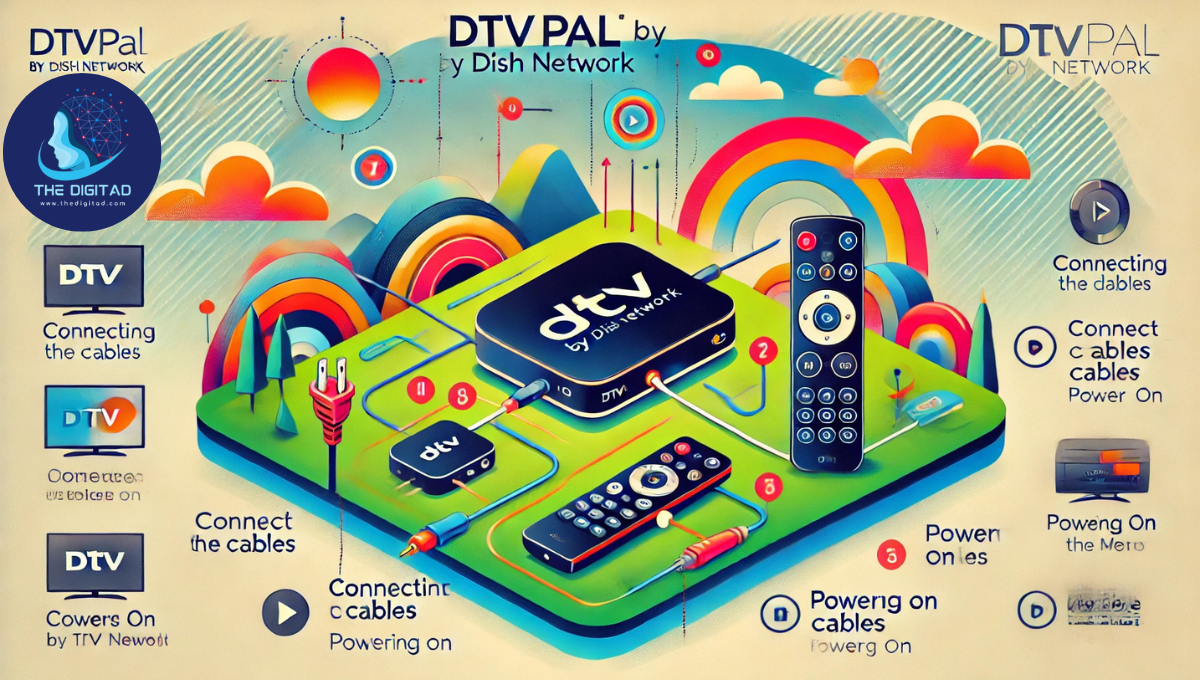DTVPal by Dish Network Setup Instructions: Your Complete Guide
Setting up the DTVPal by Dish Network isn’t as difficult as many may have made it seem. So long as a person is newbie in setting digital TV, then these instructions will guide them through. You connect to a new HDTV or even run some error checking, these setup tips will make it painless. Here’s to just getting the best out of your DTVPal by Dish Network setup instructions.
What is the DTVPal by Dish Network?

What is the DTVPal by Dish Network?
Introduced by Dish Network, the DTVPal is a set top box that helps use the existing television by converting the signal into analog thereby allowing free over the air television services to be accessed. The user friendly and easy to install DTVPal by Dish Network is there to help convert analog to digital broadcasting with its friendly interface helping the users to navigate easily. The DTVPal by Dish Network setup instructions are easy for newcomers as they are detailed. They start with connecting the device to the TV, then scanning for channels, and finally optimizing the reception. Most people have found following the DTVPal by Dish Network setup instructions makes it easy and smooth to install in no time for one to enjoy multiple digital channels directly without any monthly subscription. This device is especially beneficial for users who want to retain their existing analog TVs while enjoying clear, digital broadcasts.
Setup Instructions for DTVPal by Dish Network
Follow these simple instructions to set up your DTVPal by Dish Network.
Unbox the DTVPal

The set contains a converter box, a remote control, batteries, a power cord, and so on. In addition to this, don’t forget to procure a coaxial cable for connecting it to the television.
Connect the Antenna
Attach the coaxial cable from your antenna to the port labeled. Antenna In on the DTVPal. This connection is crucial as it receives broadcast signals.
Connect to the TV
Using an appropriate cable; connect the DTVPal’s “Out to TV” port to the input port of your television. Use either a coaxial or RCA cable based on your TV type. Older TVs will use the coaxial connection, while newer models might use RCA inputs.
Power On the Device
Insert the power supply adapter of the DTVPal into an appropriate socket and switch the device on. Also use the remote control to switch the device on as well.
Select the Correct Channel on the TV
In the majority of the installations, the television is set to channel three or four. Choose the option that has the least distortion.
Run the Channel Scan
Use the DTVPal remote to navigate to the “Menu” and select “Auto Scan.” This step scans for available digital channels in your area.
Adjust Settings as needed
After scanning, you can adjust settings, like aspect ratio and language preferences, in the “Settings” menu.
Troubleshooting Common DTVPal Setup Issues
Even with easy instructions, users sometimes face challenges. Here are a few troubleshooting tips for the DTVPal by Dish Network.
No Channels Found
If no channels appear after scanning, check your antenna. Ensure its securely connected and aimed correctly. Re scans and sees if it picks up any stations.
Poor Picture Quality
Poor quality often results from weak signal strength. Adjust the antenna’s position and try rescanning.
Device Not Turning on
Kindly check whether the power charger has been properly connected and whether the socket is functional. If remote is not working, please replace batteries.
Audio Issues
In the absence of sound, inspect the volume settings of the TV. And make sure you have selected the appropriate input source on your TV.
Benefits of the DTVPal by Dish Network
The DTVPal by Dish Network is packed with features that improve the viewing experience.
- Digital Quality on Analog TVs
The adapter enables usability of older CRT TVs for digital transmissions thus making it possible to retain your current Television. - Electronic Program Guide
The EPG provides information about current and upcoming shows. - User-Friendly Interface: Users of all ages may easily navigate the menu because of its straightforward layout.
Dish Network’s Quick Setup Checklist for DTVPal
| Step | Action | Notes |
| Unbox the DTVPal | Gather components | Ensure you have all parts |
| Connect the Antenna | Connect to “Antenna In” port | Ensures signal reception |
| Connect to the TV | Use coaxial or RCA cable | Matches your TV’s input type |
| Power On the Device | Plug into outlet, power on | Use remote for power |
| Tune TV Channel | Set to Channel 3 or 4 | Test for best picture quality |
| Channel Scan | Run “Auto Scan” | identifies the digital channels that are available |
| Adjust Settings | Use DTVPal menu options | Customize aspect ratio, language, etc. |
Tips for Enhancing DTVPal by Dish Network Performance
To maximize the DTVPal by Dish Network experience, try these tips.
Use a High-Quality Antenna
Antenna plays a significant role in attracting more channels therefore a good quality antenna will assure you more channels. An outdoor antenna is usually far better than an indoor antenna.
Position the Antenna Correctly
Point the antenna toward the nearest broadcast towers. Websites like FCC.gov provide maps showing local tower locations.
Perform Regular Scans
Re-scanning every few weeks ensures your channel list is up to date. Some channels might be added or moved.
Avoid Obstacles
Placing the antenna near a window and away from large metal objects can help avoid interference.
Maintain the Device
Keep the DTVPal clean and dust free. Replace batteries in the remote regularly to ensure responsive controls.
Pros and Cons of the DTVPal by Dish Network
Pros
- Easy setup with user-friendly instructions.
- Improves the viewing experience on analog TVs.
- Includes an electronic program guide.
- Budget-friendly alternative to cable.
Cons
- Requires a separate antenna for signal reception.
- Limited to live TV with no DVR capability.
- Performance depends on signal strength in your area.
FAQs about DTVPal by Dish Network Setup Instructions
Q1: Does the DTVPal by Dish Network work with all TV types?
Yes, the DTVPal works with both analog and HDTVs. For analog TVs, it enables digital broadcast reception. HDTV users can also benefit from enhanced clarity.
Q2: What channels can I expect after setup?
The channels available depend on your location. Generally, you’ll get local stations and some additional sub channels.
Q3: How often should I rescan for channels?
It’s recommended to rescan once a month. Channel availability can change due to weather or other factors.
Q4: Can I connect the DTVPal without an antenna?
No, the DTVPal requires an antenna to pick up broadcast signals. Ensure you have a good-quality antenna for the best results.
Q5: Does DTVPal by Dish Network have DVR capabilities?
No, the standard DTVPal doesn’t record programs. For DVR features, you would need to consider Dish Network’s DVR products.
Q6: What if I lose the remote?
Universal remotes that support Dish Network devices will generally work with the DTVPal.
Final Thoughts on Setting up DTVPal by Dish Network
Setting up the DTVPal by Dish Network is straightforward, even for those new to digital receivers. With a few connections, a quick scan, and some antenna adjustments, you can be watching digital quality TV on an analog set in minutes. Following these setup instructions will get you the best performance from your device.
Summary of DTVPal by Dish Network Setup Instructions
From connecting cables to running scans, setting up the DTVPal by Dish Network is manageable for all skill levels. With this guide, you avoid all the probable problems, and your setup will go as smoothly as possible. Follow these, test your signal, and enjoy the best channels on enhanced clarity and simplicity.
Read more Article About Gadgets and other Categories at The digit Ad



















Post Comment